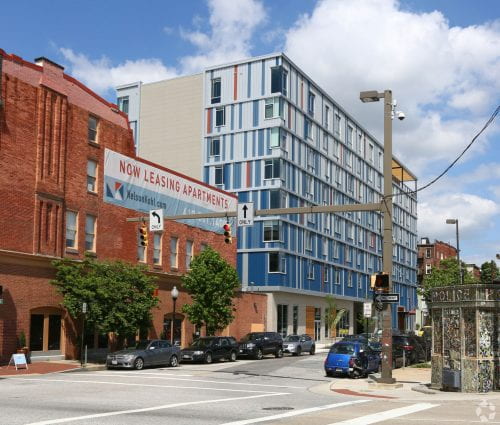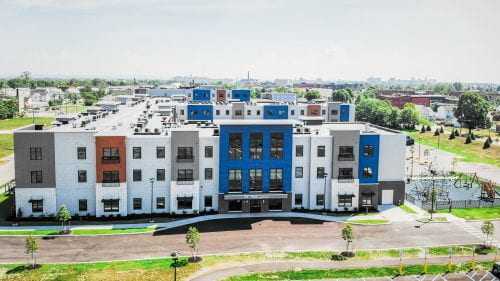On Thursday, September 3rd, 2020, the Cornell Baker Program in Real Estate welcomed Ernst Valery (BS ’00, MPA ‘01) as the first speaker in this Fall’s Distinguished Speaker Series. Mr. Valery is the founder and president of EVI, an affiliate of SAA|EVI, a minority-owned real estate development firm that focuses on urban transitional areas. Over his 16-year career, he has developed mixed-use and multi-family projects, in addition to single-family renovations, across the United States. Mr. Valery obtained a Bachelor of Science in Urban Planning and International Relations and a Masters of Public Administration and Policy Analysis from Cornell University, a Masters in Real Estate Development from Columbia University, and has served as a Research Affiliate and Fellow in the Mel King Community Fellow Program at the MIT CoLab.
As a teen, Mr. Valery had dreams of becoming an architect but ultimately found himself drawn to the field of urban planning for its connection to the lives and experiences of everyday people, specifically in an urban context. Uniquely, he was also interested in financing and completing projects, areas not typically in the domain of the planner. Combined, this duality led him to his passion for real estate development, which he describes as having “magic powers” in creating the built environment.

Mr. Valery expressed the power, both positive and negative, that developers wield in transforming communities. Unlike other professions with ethical and professional oaths, developers have no such “do no harm” mandate. Mr. Valery noted, “it is the only thing that I can think of that has such a great impact on the lives of people where you don’t have to have a license to do it.” Mr. Valery urged the audience to “consider a paradigm shift in the entire field so that real estate professionals can be more effective in developing urban communities and rural communities in context, and in response to the people that are there”. Fully considering the unique characteristics of the community members and their neighborhood is critical in sustainable development. The movement towards community-focused development requires a change in the make-up and priorities of the field. “We need more diversity in development because cities are diverse, and we need a different way of thinking; a more holistic and morally sound foundation for real estate developers…I’m really pushing for a cross-collaboration between planning, architecture, and art, and for real estate professionals to lead this new way of thinking…this new paradigm of development without displacement, where inclusion is paramount”.
Gentrification, a common byproduct of development, was a focus of Mr. Valery’s speech. Efforts to revitalize urban neighborhoods with an influx of development have often led to gentrification, whether by design or not. He notes that a community that “is full of people of color, immigrants, (they are) lively, they’re working, and they have money” has not historically attracted capital but once white artists move into that neighborhood, the investment community is suddenly interested. Going into a community as a developer, Mr. Valery’s strategy is “how do we keep these folks in this community, and how do we bring other assets in too?” It is critical as developers to understand the unique needs of the community to maximize success for both the project and the neighborhood. By partnering with the community, other benefits, such as public artwork, can be created to enhance both the livability and the desirability of the neighborhood.

Mr. Valery considers EVI an innovation company, in rejection of the typical rigid development model that lacks the flexibility needed to tackle sustainable and site-specific project needs. Nurturing deep ties to the community has been a key factor in the success of their business, particularly in the time of COVID-19, during which he has not experienced the same struggles with tenant payments and default as other developers. He cautioned against the instinct for greed, which can prevent long-term success in the real estate business. He adds, “if you are rooted in the community, if you are rooted in fairness and leveling the playing field, you will be very successful”. To expand on that point, Mr. Valery shared an experience from early in his career where he learned the difference between completing projects solely for the profit versus projects undertaken for the benefit of both the community and the developer. This formative early career experience ultimately drove him to pursue his Master’s in Real Estate in an effort to “use density as a tool to make sure that you are not displacing folks”.
In furtherance of these goals, EVI is launching the new Aequo Fund, targeting emerging markets like Philadelphia, Baltimore, and Buffalo, while maintaining a triple bottom line of solid financial returns, supporting communities, and sustainability. The $5 million Aequo Fund emerged from a developer apprenticeship program Mr. Valery spearheaded in Baltimore. The Fund will target mixed-use and multi-family opportunities in these markets, working in cooperation with the local community. Mr. Valery hopes that the opportunity to work on these types of projects will attract students and young developers interested in strengthening his movement towards sustainable and cooperative development.

